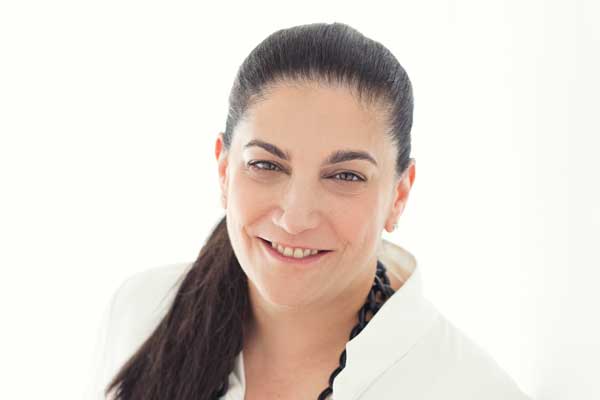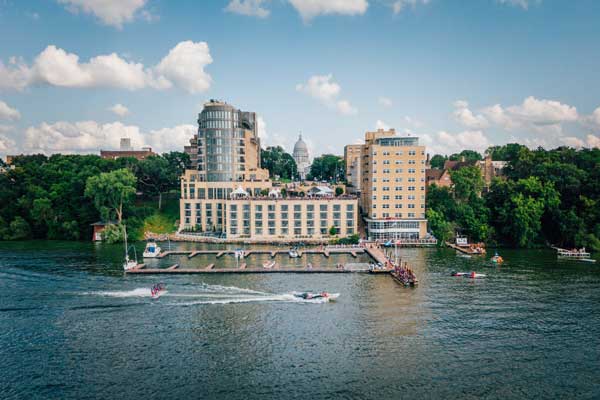Ever since it opened in 1948, The Edgewater, located on the shore of Lake Mendota in Madison, Wisconsin, has become a prominent and iconic part of the city. Owned by local Robert Dunn, the hotel underwent an extensive, US$110 million renovation and added public spaces as late as September 2014.
In its over seven decades of existence, the hotel is now being led by its first and only female general manager — Amy Supple. Supple joined The Edgewater in 2007 and, for the past eight years, has served as senior vice president and COO. Supple, who entered this role from another industry, believes in personally engaging with staff and clients to learn more about them. She counts it as one of the most valuable lessons ever learned in her role.

“We are spending a lot of time figuring out what our customers truly value and how we can best deliver it,” Supple says. “With inflationary pricing driving nearly every decision, we can’t lose sight of delivering on what people value. And I believe, more and more, value will be derived from personalized service and interactions above physical items.”
As hotels continue to grapple with staffing challenges and the world inches closer to an automated society, Supple raises a cautionary flag. She says that in the “business of delivering genuine hospitality and proving those surprise and delightful moments, the human touch is inevitable.”
Supple recently spoke to HOTELS about the power of human touch, the challenges she faced as a woman leader, repositioning The Edgewater as an urban resort and plans for the hotel as it turns 75 in 2023.
HOTELS: You are the first and only female managing director of The Edgewater. What valuable lessons have you learned in your role that you would pass on to other women in your role or aspiring to become MDs?
Amy Supple: Make the time to engage with clients and staff directly, to learn more about their experiences and what is or is not working in your processes. I try to find time every day to walk around for 30 minutes or so and talk with people. I find out a ton of good information and have the added benefit of getting to know people better. When I hear good advice or I hear about a consistent issue, I take action. People appreciate the fact that they know they are being heard and have made a difference.
H: What challenges have you faced as a woman leader?
AS: In my career, I’ve mainly worked in commercial real estate development and now in hospitality management. And I’ve experienced bias toward my leadership in both. I’ve always taken the stance that right or wrong, it exists. But if I push through it, get the job done and do it well, most of the bias goes away with time. There are a handful of instances where that strategy didn’t work, but none that stopped or slowed my career.
H: What obstacles did you face in the reopening The Edgewater amid a pandemic?
AS: The biggest obstacle has been with staffing. As a company with independent ownership, we made the strategic financial decision to keep the management team together. This helped us ride the wave, and when business returned, we were able to jump back in with an experienced team in place. We had also taken the time to cross-train our management team during the slow time, and this helped with the operational support to keep up with the demand, with staffing still a struggle.

H: You have had a lot of success repositioning the hotel as an urban resort. What were the one or two keys to this success?
AS: We have embraced Madison and our place in this community. Our location in the heart of downtown certainly helps, but we also designed the building to have both public and private elements. The community is welcome here for events, or just to enjoy the sunsets over Lake Mendota. And by doing that, we created a great destination for visitors.
H: The Edgewater will be turning 75 next year. What’s next?
AS: The US$110 million property reinvestment program in 2014 helped create the infrastructure that will allow us to grow into the future. We have still not maximized the potential of this property and are planning for future investments to enhance the property and maintain it as a top leisure destination in the Midwest.
H: What do you do differently than other GMs?
AS: Having previously worked in commercial real estate development, I came to this role from outside the industry, and I saw this business through a different lens. I understood the vision of being “Madison’s Place” meant it had to be more than a hotel and banquet facility – it had to become central to the community. To do this, we’ve done a lot of things like free concerts and public events that don’t necessarily make sense with a paralleling strategy to be a 4-diamond, luxury resort. But I’ve always taken the stance that we can do it all if we do it well. This has made us push ourselves to be unique.
H: Who has been your mentor and what is the best piece of professional advice you have ever received?
AS: The owner, Bob Dunn, has been my mentor. I’ve worked for Bob for nearly 22 years, starting as a development associate in the sports development division of the company and working my way up to COO and managing director of The Edgewater. Bob is a visionary, and no project is too complicated or too challenging for him and his partners to take on. He taught me a lot about believing in a vision and then taking the steps to make it happen, never giving up when things got difficult. We’ve worked on some incredible projects together, none more interesting to me than The Edgewater. His best advice was, “if not now, when?” That’s a good question to ask yourself when you’re unsure if something can get done. If you can’t answer when the answer is probably to do it now.
H: Which emerging trend are you focusing on?
AS: Value. We are spending a lot of time figuring out what our customers truly value and how we can best deliver it. With inflationary pricing driving nearly every decision, we can’t lose sight of delivering on what people value. And I believe that more and more, value will be derived from personalized service and interactions above physical items.
H: What’s the biggest threat to the hospitality industry?
AS: Big meetings and conventions. There was a rush back and now we see a more tepid response. Time will tell, but it does concern me.
Also, the loss of human touch. With staffing challenges, I’m concerned that an automated society may become a reality. And in our business of delivering genuine hospitality, and proving those surprise and delightful moments, the human touch is invaluable.

H: What is one unusual thing you learned on the job?
AS: How unique it is to be surrounded by our employees who come from such diverse cultures and backgrounds. I’m always learning and growing from my interactions with our team members. I love that part of the job.
H: Where are you finding happiness today?
AS: Being out and about more – the joy of having dinner out with friends.
H: What’s your hotel pet peeve?
AS: When I go to other hotels and notice that the employees are not trying to make a connection with the guest. It’s not that hard to do and if you don’t like to talk to people, you probably are in the wrong place.
H: Which historical figure would you love to host?
AS: I love to read and study history, so there are many. But, because of the timeliness, I’ll say Queen Elizabeth II. Certainly there are questions we can debate about the monarchy, but as an individual, I think she was extraordinary. To think of the things she must have experienced and been privy to over time are just fascinating. And, through it all, she managed to keep a sense of humor.
